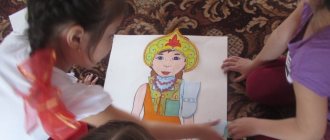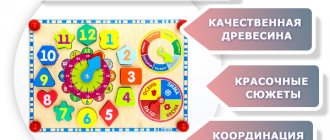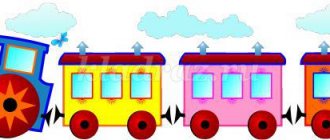Didactic game as a means of teaching preschool children
Preschool age is one of the most important periods in the life of every child, during which the development of imaginative forms of knowledge of reality - perception, imaginative thinking and imagination - occurs. The child becomes ready to study and acquire knowledge about the world around him. Children are active in various types of activities, such as play, work, study, and the child also develops independent play activities.
Each teacher in his activity sets a goal in which the main task of teaching is to ensure that each child acquires knowledge, and to the extent that he can easily use this knowledge in the future. The accuracy and completeness of the child’s reproduction of acquired knowledge mainly depends on how the material was memorized and how it was organized. Therefore, given the fact that play activity is the main one in preschool age, its correct organization is one of the ways of pedagogical influence on the child by the teacher.
Play in preschool childhood has developmental significance. Games during the learning process are of great interest to preschoolers. These are games that make you think, provide the child with the opportunity to test and develop his abilities, including him in competitions with other peers [3, p.97].
During the game, each child begins to develop voluntary memory and attention, as a result of which children can concentrate better and remember more from the proposed material. That is, by correctly organizing the student’s play activities, the teacher can achieve greater efficiency in the learning process he organizes. During play, children develop as individuals, each of them develops such aspects of the psyche, which will subsequently determine the success of children, both in educational activities and in work, as well as their relationships with others.
Didactic games play an important role as a means of learning in preschool pedagogy, which can serve as the main part of classes, helping to assimilate and consolidate acquired knowledge and master the methods of cognitive activity. A significant feature of didactic games is that tasks are presented in a playful form and include not only a cognitive, but also an educational component. The teacher organizes and directs the game, acting as a performer of the game task, an assistant in making the right choice, as well as supporting and enhancing the positive influence of the students on each other.
Didactic games can be classified as games with objects and toys, verbal, board and printed, musical and didactic. Games also have a certain structure, which characterizes it as a form of learning and gaming activity. As a rule, such structural components of a didactic game are distinguished as a teaching (didactic) task, game actions, rules of the game and its result.
The educational (didactic) task is determined by the purpose of teaching, educational influence and is formed by the educator, reflecting his activity (for example, in a didactic game, in accordance with program tasks, the ability not only to form words from letters is reinforced, but also counting skills are practiced). That is, it is necessary to formulate the learning task as a game one, and the more varied it is, the more interesting and successful the game itself is for the children.
For example, in children of three and four years old, the attention is not yet stable, therefore, in order to firmly assimilate knowledge, they need to be as interested in work as possible; for this, it is advisable to conduct verbal didactic games, but with a large set of visuals. Conduct a casual conversation with children at a leisurely pace, using bright visual aids and game exercises, didactic games, all this will create a positive emotional mood in the children.
The opportunity to teach young children through active activities that are interesting to them is a distinctive feature of didactic games. However, it should be noted that the knowledge and skills acquired by the players are for them a by-product of the activity, since the main interest is not the learning task, but the game actions - for children of early and junior preschool age, and the solution of the game problem, winning - for children of senior preschool age age [4, p.323].
For preschoolers of five and six years old, the higher the level of their general development, the more valuable games are for the development of amateur forms of behavior. The game stimulates children's curiosity and the need to actively act, enriching them with the necessary knowledge and developing skills and abilities, stimulates thinking, which helps to identify the existing inclinations of a preschooler and turn them into abilities. While playing, the child realizes that his success mainly depends on effort and this gives him the opportunity to learn something new.
Didactic games are a universal means of comprehensive development of a preschooler, since such games contribute to the development of cognitive abilities. This is the acquisition, generalization and consolidation of new knowledge; analytical and synthetic activities are carried out by dividing complex phenomena into simpler ones or, conversely, individual ones are generalized. Didactic games are beneficial in that they teach preschoolers to apply their existing knowledge in new conditions, enriching their sensory experience. They replenish and activate the vocabulary, promoting the development of the child’s speech, developing coherent speech. For example, by encouraging children to repeat the same sound combination many times (taking on the role of a bird or a car), the child actively reproduces the desired sound and the more passionate he is about this process, the more complete the pedagogical effect.
Social and moral education in didactic games is facilitated by the fact that children learn, show a sensitive attitude towards each other, be fair, give in and help if necessary, sympathize, that is, they learn about the relationships of children among themselves and with adults. Preschoolers think about the actions they have taken and how correct and appropriate they are in specific situations.
The pedagogical value of didactic games lies in the following:
– preschoolers are given tasks that require attention, concentration, sequence of actions, mental effort and the ability to comprehend the rules;
– didactic games contribute to the development of children’s sensations and perceptions, the acquisition of knowledge and the formation of ideas. These games teach children a variety of economical and rational ways to solve mental and practical problems, which is their developmental role.
– in order to develop the abilities of preschoolers, it is necessary to ensure that didactic play becomes not only a form of mastering individual skills and knowledge, but also contributes to the overall development of the child.
– to solve the problems of moral education, to develop children’s sociability in didactic games, the teacher creates conditions for children that require them to be able to play together, be honest and fair, demanding and compliant, and also regulate their behavior.
Thus, for the successful education of preschoolers, consistency is needed. Games should be selected with consistently developing and increasingly complex content, with didactic tasks, game actions and rules. For developmental and educational results, all games must be used in the system. Educational and cognitive tasks in didactic games are interconnected with gaming ones and, therefore, when organizing games, it is necessary to pay attention to the presence of entertaining elements in the classroom: surprise, search, guessing.
Literature:
- Bondarenko A.K. Didactic games in kindergarten / A.K. Bondarenko M.: Education, 1991. - 160 p.
- Ivanova M. Yu. Didactic game as a means of educating and teaching preschool children. [Electronic resource] / M. Yu. Ivanova // Social network of preschool education workers. 2015.
- Game and preschooler. Development of children of senior preschool age in play activities: collection / ed. T. I. Babaeva, Z. A. Mikhailova. SPb.: “CHILDHOOD-PRESS”, 2007. - 192 p.
- Kozlova S. A. Preschool pedagogy: a textbook for students. avg. prof. textbook institutions / S. A. Kozlova, T. A. Kulikova. 7th ed., erased. M.: Publishing house, 2007. - 416 p.
- Elkonin D. B. Psychology of play / D. B. Elkonin M.: Education, 2000. - 264 p.
Consultation for educators “Basic functions of didactic games” consultation on the topic
Consultation for educators
“Basic functions of a didactic game”
“Without play there is no, and cannot be, full mental development. A game is a huge bright window through which a life-giving stream of ideas and concepts about the world around us flows into the child’s spiritual world. “Game is the spark that ignites the flame of inquisitiveness and inquisitiveness.”
V. A. Sukhomlinsky
For preschool children, didactic play is of exceptional importance: play for them is study, work, and a form of education. Didactic games promote the development of perception, attention, memory, thinking, the development of creative abilities and are aimed at the mental development of the preschooler as a whole. A didactic game is a multifaceted, complex pedagogical phenomenon: it is a gaming method of teaching preschool children, a form of education, an independent gaming activity, and a means of comprehensive education of a child’s personality.
Play is of great importance in the life of a preschooler. The need for play and the desire to play in preschoolers must be used and directed in order to solve certain program problems. Recently, the use of didactic games in teaching preschoolers the basics of mathematics has become especially important. The use of didactic games increases the effectiveness of the pedagogical process in the development of children's mathematical concepts; in addition, they contribute to the development of memory and thinking, having a huge impact on the mental development of the child. Didactic play is a valuable means of cultivating children’s mental activity; it activates mental processes and arouses a keen interest in the process of cognition in preschoolers. In it, children willingly overcome significant difficulties, train their strength, develop abilities and skills. It helps to make any educational material exciting, causes deep satisfaction in children, creates a joyful mood, and facilitates the process of assimilation of knowledge.
The main feature of didactic games is determined by their name: they are educational games. They are created by adults for the purpose of raising and educating children. But for playing children, the educational value of didactic games does not appear openly, but is realized through the game task, game actions and rules. In teaching preschool children, as a rule, games are used with a predetermined course of game actions and a clearly defined “educational” principle associated with the transfer and application of knowledge, with exercises, and the mental development of children. A didactic game is a complex phenomenon, but it clearly reveals a structure, that is, the main elements that characterize the game as a form of learning and gaming activity at the same time. The main structural components of a didactic game are: game concept, rules, game actions, cognitive content or didactic tasks, equipment, game result. In a didactic game, its concept, rule, action and the mental task included in them represent a single system of formative influences.
With the help of didactic games, the teacher not only conveys certain knowledge, forms ideas, but also teaches children to play. The basis for children’s games are formulated ideas about the construction of a game plot, about various play actions with objects. It is important that conditions then be created for the transfer of this knowledge and ideas into independent, creative games, the proportion of which in a child’s life should be immeasurably greater than learning to play.
We can say that didactic games stimulate the active intellectual activity of a preschool child, contribute to the development of his cognitive activity, and increase the creative potential of the children's team. The use of didactic games in the process of teaching and upbringing a preschooler helps to develop in him those qualities that will help him in the future in the first stages of schooling.




